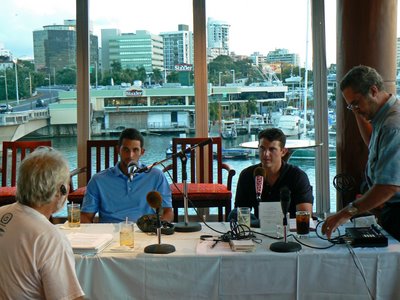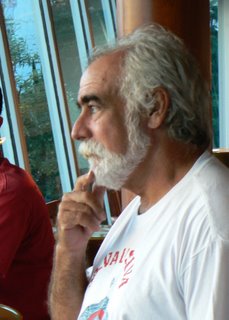 Dateline: San Juan. Live! from Club Nautico on WOSO, Friday, Nov. 24. Hosted by Ryan Christiansen, with guest host Eduardo Emmanuelli, and guests Ricardo de Soto, CoastKeeper Puerto Rico, Monica Perez Nevarez, Executive Director of CoastKeeper, and Paco Lopez, proponent of the first urban marine reserve in Puerto Rico.
Dateline: San Juan. Live! from Club Nautico on WOSO, Friday, Nov. 24. Hosted by Ryan Christiansen, with guest host Eduardo Emmanuelli, and guests Ricardo de Soto, CoastKeeper Puerto Rico, Monica Perez Nevarez, Executive Director of CoastKeeper, and Paco Lopez, proponent of the first urban marine reserve in Puerto Rico. Here's Riki in a pensive moment, minutes before going on air.
Here's Riki in a pensive moment, minutes before going on air. Eduardo, listening attentively to the Sound Engineer.
Eduardo, listening attentively to the Sound Engineer. And Ryan, going over his notes for the interview.
And Ryan, going over his notes for the interview. The setting was the Red Room of Club Nautico's sumptouos third floor facility, with this spectacular view. Sherman Wildman, owner of WOSO, graced us with his presence during the interview, but stayed in the background.
The setting was the Red Room of Club Nautico's sumptouos third floor facility, with this spectacular view. Sherman Wildman, owner of WOSO, graced us with his presence during the interview, but stayed in the background.We discussed a little history of activism in Puerto Rico, particularly in regards to the Northeast Ecological Corridor, Piñones and Rincón, where for over ten years small bands of surfers, students, professors and locals carried on the fight for the preservation of our natural resources which recently culminated in the passage of House of Representatives Bill 2105, creating a Nature Preserve out of the Corridor, and, some time ago, a Marine Sanctuary in Rincón.
We went on to discuss the Waterkeeper Alliance, which you can check out on their website, http://www.waterkeeper.org/mainarticledetails.aspx?articleid=264, and a brief discussion of CoastKeeper Puerto Rico's future goals. Unfortunately, sustainable development and nature restoration and management are not subjects conducive to good sound-bites, and the answers are too long to list; but that is the challenge faced by activists in Puerto Rico today.
The subject includes not only the science of conservation, it includes resource management, economic viablity, widespread education and teaching resources, as well as the continued wellbeing of the flora and fauna that we share the earth with. And becuase the environment is also a web of interconnecting ecosystems, it is also political and international in scope. It takes into account the history of the people and places we are trying to save, as well as how we can all adapt to changing global conditions in the future. It is something that every single person should do his or her utmost to learn about and support on a personal level, as well as demanding of our politicians the collective action needed to express our will.
In order for future generations to thrive, a profound change must occur in the way we do business. Not just "we" as individuals, but "we" as corporations and multinationals, which have become so large as to make small nations' GDP's pale in comparison, and yet are not accountable for the damage that their business extracts from the earth. Which is why Natural Resource Accounting is an idea whose time has come.
We cannot expect to have our taxes continue to be used to clean up someone else's mess. That is a de facto subsidy, and most large corporations already get enough of those. So this means new regulations and new ways of doing things. And it won't be easy. Corporations are powerful and rich entities that will not go quietly into the night, and they do not like giving up a single penny of their profits either. And most insiduous of all, no one can expect a business to keep growing ad infinitum, at the expense of our air, water or land. And yet, that is exactly what some corporations are in fact doing. On the other hand, we as individuals are looking at having to spend a little more for what we get today at a cheaper rate, simply because those costs are not included in the retail price of things. But the more transparent our economy becomes, the more things will even out.
So we must bring about a whole new way of thinking about ourselves and how we live on this earth, what kind of footprint we want to leave behind, whether we can truly live side by side with someone who is destitute without helping them, and how much ecological debt we want to saddle our children with.
The internet is a wonderful source of information. All you have to do is "google" a subject and hundreds if not thousands of related websites appear. By all means attend workshops and lectures, but use the web, go to Amazon.com and buy some books to read next time you are on vacation, go to the various forums on Yahoo or AOL and "talk" to other people about what is going on. Get involved! We must all feel as owners of our life, our home and of this island. And together we can do more than survive, we can act ethically, and be morally responsible. Because I don't want to leave this earth feeling like I cheated future generations out of their inheritance solely to meet my short term goals.
There is a very telling study I read recently about a tribe of indians in the Pacific northwest which own a forest they have been harvesting sustainably for the past two hundred years. They started with 1 million board feet of available lumber. Their neighbor, an American paper and pulp giant, recently clear-cut a swath of land comparable in size to theirs. They got 2 million board feet of lumber out of it in one year, but left a desolate, barren place where there was once a thriving forest that took thousands of years to grow. The Indians, by contrast, have been able to cull 1 million board feet a year for the last 200 years, and yet have grown their standing forest to 1.5 million board feet. They harvested slower, and smarter, and still have their resource. Now that is what I call an elegant solution.

1 Comments:
hi
Post a Comment
<< Home